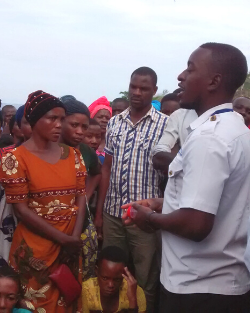Community Empowerment Through Knowledge Sharing and Involvement
By Ronald Jackson, Jubilee Hope Programme Manager
The Jubilee Hope Programme began six years ago on the islands of Lake Victoria and was started as a response to the healthcare needs of the islanders. It followed an in-depth assessment of the community health needs that was carried out before the programme started. The findings included high child mortality, high rates of preventable diseases, lack of access to essential healthcare, lack of safe water supply, poor sewage and waste disposal among many other difficulties.
Looking at the health situation described above, one would easily wonder where to start. The Vine Trust and the African Inland Church Tanzania who are partners in the Jubilee Hope Programme, sought to work with other stakeholders in addressing the situation that the island communities were facing. Key among these stakeholders were the community members themselves and their leaders who were involved in the assessment, diagnosing, planning and implementation of interventions.
One gap identified during the assessment phase was the lack of knowledge on disease prevention and control of preventable communicable diseases. The key intervention in this gap was the sharing of public health information. Therefore, it was considered very necessary to share with the islanders the information regarding preventable diseases. This had to be done in a language and manner that is easy to understand and applicable to the islands circumstances and in respect to their culture.
The Jubilee Hope Programme has been successful in the sharing of public health messages, mostly it has been more informal than formal. This has been because a majority of the islands community have had limited formal education, therefore making it difficult to use formal education system to share the public health information. We mainly used public speaking including the use of pictorial posters to pass on the messages.
In implementing the interventions planned, the Jubilee Hope considers community involvement as key in ensuring empowerment. This involvement ensures that the community makes a contribution in ideas and other means to the intervention therefore fostering ownership. We have been successful in this through meetings with both community leaders and members from the islands that we serve. This has also been successful through participation in community activities like an organised community cleaning day planned for every first Saturday of the month and through sports, particularly, starting a men’s football club (very popular on the islands where we serve). This has led to the programme expanding to initiate other smaller projects like the safe water provision and women’s HIV Support Groups. It is within these groups that we have been able to forge a strong relationship with the islands communities we serve and through this we have seen real changes in the health status of the islanders.
In conclusion, indeed knowledge is power and knowledge shared is knowledge gained. An involved community is an empowered community. This has been true for the islanders and the Jubilee Hope Programme.
